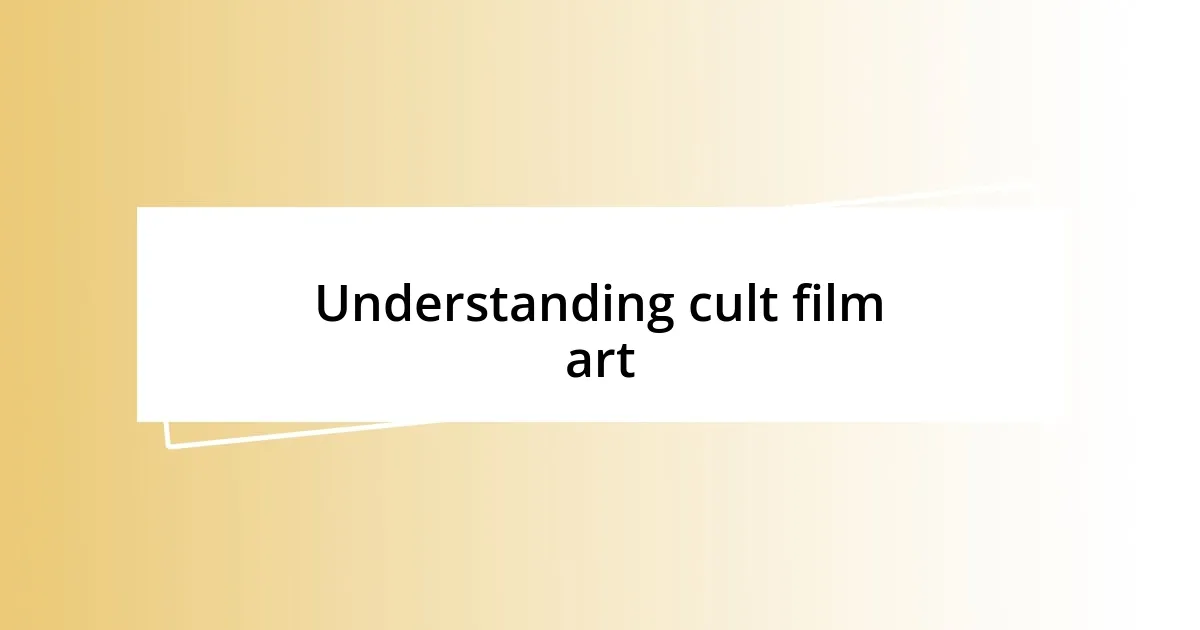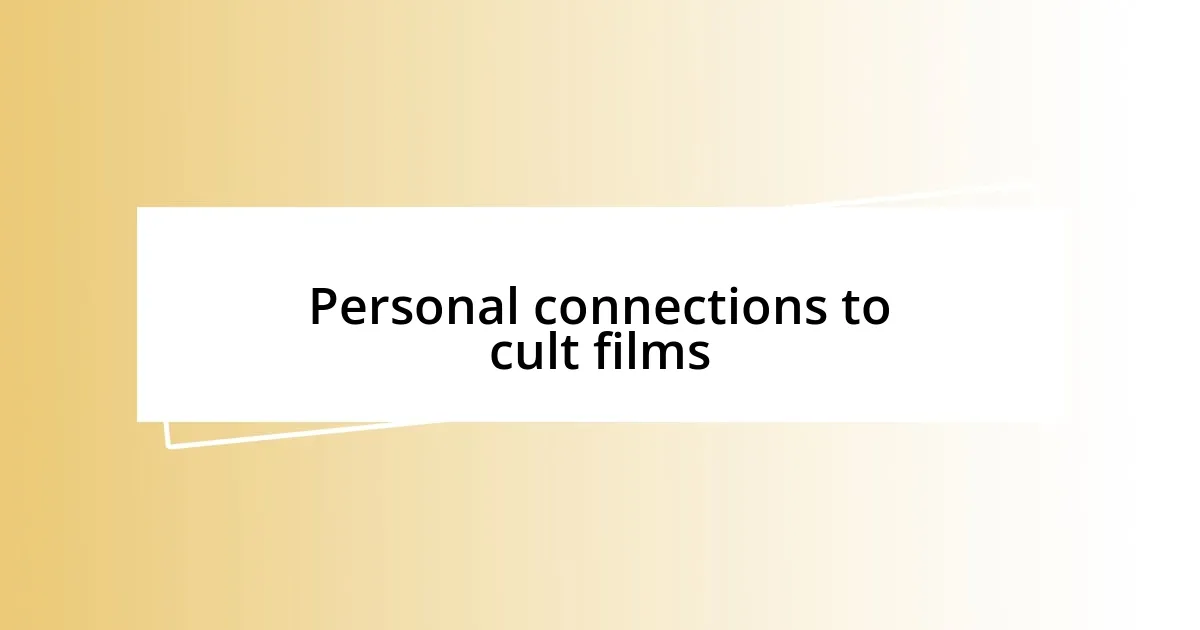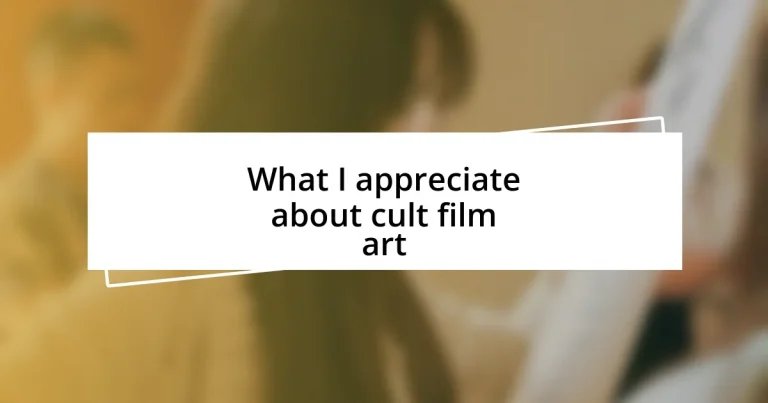Key takeaways:
- Cult films create immersive experiences and emotional connections for audiences, challenging societal norms and provoking thoughtful dialogue.
- They often reflect marginalized voices and subcultures, fostering a sense of belonging through unconventional narratives and iconic characters.
- The cultural impact of cult films includes community building through participatory experiences and influence on various art forms, demonstrating a shared passion among fans.
- Personal connections to cult films highlight their ability to resonate with individual experiences, sparking meaningful conversations and reflections on life’s authenticity.

Understanding cult film art
Cult film art is a fascinating blend of creativity, rebellion, and unique expression. I remember the first time I stumbled upon “The Rocky Horror Picture Show.” It felt like stepping into an alternate universe where anything was possible, and the energy in the theater was palpable. This immersive experience showcases how cult films create spaces where audiences feel an emotional connection, almost like being part of a secret club.
What strikes me most about cult film art is its ability to challenge societal norms. Take “Pink Flamingos,” for instance. The outrageousness of John Waters’ vision forces us to confront our own perceptions and preconceptions. Isn’t it intriguing how these films push us to question what we find acceptable? They provoke thought, sparking a dialogue that can linger long after the credits roll.
I’ve found that cult films often hold a mirror to subcultures and marginalized voices in society. In watching films like “Clerks,” I’ve sensed a profound relatability—and that realization is powerful. It reminds me of the importance of storytelling in giving voice to our experiences. How often do you see your own story reflected on the big screen? Cult films provide that crucial space, making art feel profoundly personal while simultaneously resonating on a broader scale.

Key elements of cult films
Key elements of cult films often revolve around their distinctive storytelling, unconventional characters, and the cultural contexts in which they thrive. I recall watching “Eraserhead” for the first time, captivated by its surreal imagery and bizarre narrative. The experience was unsettling yet oddly comforting—like being in a dream you can’t quite escape, which is exactly what cult films often aim to do. These films resonate deeply with audiences because they defy mainstream conventions, inviting viewers to partake in an alternate reality where anything goes.
Here are some defining characteristics of cult films:
- Unconventional Narratives: They often eschew traditional plot structures, embracing disjointed or non-linear storytelling.
- Strong Subcultures: Cult films frequently celebrate marginalized voices and themes that resonate with specific communities, creating a sense of belonging.
- Iconic Characters: Many cult films feature distinct and quirky characters that viewers remember long after the credits roll.
- Provocative Themes: They challenge societal norms and provoke conversations about topics that are often considered taboo.
- Immersive Fan Experiences: Fans often engage with the film beyond viewing, participating in midnight screenings or creating fan fiction.
Each of these elements contributes to the unique allure of cult films, transforming them into a shared experience that fosters connections, reflections, and sometimes even a sense of rebellion against the mainstream.

Cultural impact of cult films
Cult films significantly shape cultural dialogue, often becoming touchstones for movements or subcultures. For example, I’ve found that films like “Lost Boys” not only defined a generation’s aesthetic but also captured the spirit of youthful rebellion. It’s intriguing to see how a simple vampire flick can evolve into a cultural phenomenon, influencing fashion, music, and even attitudes towards youth culture. Cult films often serve as a reflection of the times, telling stories that resonate deeply within specific cultural contexts.
Moreover, cult films create communities that bond over shared passions. I remember attending a midnight screening of “The Room.” It was electric—the audience engaged in a dialogue during the film, shouting lines and throwing props. This experience opened my eyes to how cult films create spaces where viewers not only consume content but actively participate in it. It’s a powerful reminder that cinema can be a communal event, linking strangers through laughter and shared appreciation.
The impact of cult films extends far beyond the screen; they often influence artistic expression in music, fashion, and even literature. I’m particularly drawn to how directors and artists pay tribute to cult classics while also innovating on their themes. Take the way “Donnie Darko” has inspired countless indie filmmakers—it’s fascinating to see how those echoes of cult cinema ripple through generations. They redefine what success looks like in art by showcasing the power of loyal fanbases and grassroots movements.
| Cultural Impact of Cult Films | Examples |
|---|---|
| Community Building | Midnight screenings and participatory cult classics like “The Rocky Horror Picture Show.” |
| Influence on Other Art Forms | Inspired filmmakers and musicians, as seen in the legacy of “Donnie Darko.” |
| Social Commentary | Films like “Pink Flamingos” that challenge societal norms. |

Personal connections to cult films
When I reflect on my personal connections to cult films, I can’t help but think about how they often mirror my own experiences. Take “Harold and Maude,” for instance; there was something profoundly comforting in its exploration of love and mortality. It felt like a secret handshake among misfits—a film that acknowledges our oddities rather than shying away from them.
I remember discussing “Fight Club” with friends over late-night pizza, dissecting its commentary on consumerism and identity. The excitement of sharing interpretations ignited a passion for film analysis that I never knew I had. At that moment, I realized how a film could spark deep conversations and connect us on more than just a superficial level.
Then there’s my love for “Clerks.” The raw, candid dialogue about ordinary life resonated with my experience as a young adult navigating the world. It made me reflect on the mundane moments that often go unnoticed but are critical in shaping who we are. The film became a sort of emotional touchstone, reminding me that the beauty of life often lies in its simplicity and authenticity. Don’t you ever find that a film can feel like a friend who truly understands you?

Tips for discovering cult films
To uncover hidden gems in the cult film landscape, I suggest starting with recommendations from fellow enthusiasts. You might be surprised by the infectious enthusiasm that blooms in film forums or social media groups. When a friend swears by a film they love, it often piques my curiosity – their passion brings the film to life before I’ve even seen it. Have you ever noticed how a glowing review can make you eager to explore something new?
Another tip is to attend local film festivals or themed screenings. I once stumbled upon a retro film series at a cozy theater, which introduced me to “The Big Lebowski” on the big screen. It was an unforgettable experience, sharing the laughter and eccentricities of the film with fellow fans. The atmosphere was charged with camaraderie, reminding me how crucial that communal element is in experiencing cult films.
Lastly, don’t be afraid to dive into movie databases or streaming services that specialize in niche films. I often find myself getting lost in curated lists that highlight everything from bizarre horror offerings to enigmatic sci-fi flicks. It feels like uncovering buried treasure, where each title might lead to a new obsession. Have you ever experienced that rush of excitement when discovering a film that seems like it was made just for you? That’s the essence of the cult film journey!








